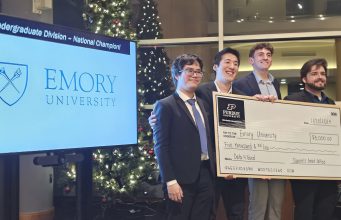
Johnson and He moderated the event.
In many ways, this year’s HackATL event marks a new beginning, with COVID-19 adding an X factor into the mix. The pandemic hasn’t been able to dampen the enthusiasm of entrepreneurial-minded students ready to take on a challenge.
For the first time in the event’s eight-year history, it was conducted fully online. In early October, more than 230 students came together, virtually, from across the globe to participate. The essence of HackATL remained the same, however, with students splitting into teams and joining forces as powerful think tanks to build a viable business in 48 hours then pitch their idea to judges, angel investors, and venture capitalists.
“This is historically one of the largest hackathons in Atlanta—and the undercurrent of COVID’s impact was evident,” said Benn Konsynski, George S. Craft Professor in Information Systems & Operations Management at Emory’s Goizueta Business School and a judge at this year’s competition. “But in many ways, it brought about some positives, including diverse and innovative ways of thinking that will fuel opportunities only just created or revealed in a world of new norms. Participants were challenged to push the envelope of what more is possible in a market that’s transitioning to meet these different demands.”

Organized by the student-run Emory Entrepreneurship & Venture Management (EEVM) club, this year’s HackATL attracted undergraduate students from a variety of schools, including Emory and Georgia Tech, University of California San Diego, and UBC Sauder School of Business in Vancouver. The theme of this year’s three-day event was the “Adventure is Out There // Explore the Unconventional,” and it included a full slate of virtual sessions, such as introductory entrepreneurship chats; a keynote speech by Matt Wallaert, author of Start at the End; and informational workshops on ideation and design thinking, alternate paths to building a startup, pitch perfect workshop accelerator, and understanding the product design process (the latter hosted by Atlanta-based Mailchimp).
On the final day, nearly two dozen judges narrowed the field to eight teams, each with unique business ideas, tackling issues from food insecurity to how best to monitor patients with Parkinson’s disease. Five of the judges peppered the teams with questions and collectively decided on the winners. Those judges included Konsynski; Dirk Schroeder, CEO, Updraft Health Innovation Advisors and adjunct associate professor of global health at Emory University’s Rollins School of Public Health; Sarina Virk Torrendell, founder, withSarina; Sig Mosley 68BBA, managing partner, Mosley Ventures LLC and Goizueta Business School’s 2020 Entrepreneur-in-Residence; and Amelia Schaffner, director of entrepreneurship at Goizueta.
The top teams were:
- First Place—oXmosis, a business which would promote cultural connections: Michael Shi 23C, Olivia He 23C, Ishika Gupta 23 (pre-BBA), and Takshil Chittlutur.
- Second Place—MedConnect, an app that would streamline medical supply disbursement: Aayush Setty, Vivienne Yu, Arjun Verma, Nicole Zhu, and Jasmine Zhong.
- Third Place—Datinerary, an app that would connect college couples with small local businesses: Ethan Ng, Raffer Li, Michelle Pan 23C, Jessica Lan 24 (pre-BBA), Rachel Cho 24 (pre-BBA), and Kushal Sanjeev.
Navigating a global event
For organizers, keeping this virtual event going in a seamless manner was its own challenge. EEVM co-presidents Veena Jaipradeep 21BBA and Felicity Lin 21BBA and their team had to balance classwork with the intricacies and rigor of hosting one of the most prominent hackathons in the Southeast.
“It was definitely challenging to do all the behind-the-scenes work virtually,” said Lin. “We had to adapt really quickly and think of innovative solutions to run a high-quality event completely online, which we have never done before. Learning to adapt quickly and utilize our resources and skills was probably the biggest lesson.”
During his keynote address, Wallaert offered sage words to the HackATL participants: “Look at the ‘itch’ that aligns to your passion—i.e., solve a problem that is known on a smaller scale first. Don’t focus on the complex, aspirational ‘scratch,’ because by keeping your eye on manageable aspects of the world’s most pressing issues, achievable through immediate actions, you’ll begin to chip away at those bigger systemic problems. For example, we can’t solve sexism in America with an app but we can create a business solution that ensures equality in gender pay right now.”
For Lin and Jaipradeep and other participants, Wallaert’s keynote summarized their drive and commitment to entrepreneurship.
“We both have a strong passion for the endless opportunities entrepreneurship provides individuals who choose to pursue that career path,” said Lin. “After becoming co-presidents of EEVM, we have experienced this firsthand. We’ve met entrepreneurs of many different backgrounds that have inspired us to start our own ventures or provided us the opportunity to work alongside them.”
Jaipradeep added, “That’s why I think HackATL is such an outstanding conduit for entrepreneurs—it constantly inspires us to continue delivering high-quality entrepreneurship information to students at Emory—because in providing that, we get to see and experience all the amazing ideas that come from a single weekend,” she said. “We can only imagine how their ideas, now accompanied with our resources and support, can grow with more time.”
For more details, visit Emory Entrepreneurship & Venture Management and HackATL.
− Reporting by Jennifer Corbett with Allison Shirreffs











